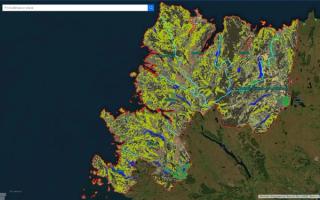NW2045 Natural capital baseline assessment
- Client Name
- Assynt Development Trust
- Location
- Northwest Scotland
- Ecology
- GIS & information systems
- Natural capital & ecosystem services

Challenge
Regional Land Use Partnership (RLUP) pilot areas have been established to help develop Scotland’s approach to land use and the transition to carbon net zero by 2045.
NorthWest2045 (NW2045) is leading the Highland RLUP. They partnered with SLR to carry out a natural capital assessment (NCA) to better understand the state of assets and ecosystem services in the region and how these can better contribute to socio-economic benefits.
Solution
SLR started the assessment by creating a map showing the regions' Natural Assets: the different habitats across the area.
Then, through the collaborative work of the NW2045 Natural Capital group and SLR expertise, we selected the Ecosystem Services to focus on.
The ESS selected were carbon storage (a ‘regulating’ service) and biodiversity (a ‘supporting’ service). These were assessed using computer tools and models.
In addition, to make this work relevant to as many people as possible, we undertook a pilot study in one Community Council area to assess the Ecosystem Services of food production (a ‘provisioning’ service) and education (a ‘cultural’ service).
The assessment process included public consultations such as online meetings and events at the Durness and Assynt Games.
Impact
Our final report can help to facilitate actions in the North West Highlands to improve biodiversity, carbon storage, and other ecosystem services.
Heathlands and bogs cover over two-thirds of the land in the North West Highlands. The societal value of carbon stored in these is arguably in excess of £10 billion andthere are significant economic opportunities in the region to capture at least part of this value.
However, the nascent carbon markets as they currently operate have potential negative consequences e.g.via: their influence on rural land markets.
Our report also includes recommendations to facilitate a Just Transition to net zero, and to improve, extend and apply this NCA. Policy options at the national level are suggested to mitigate negative impacts and to promote community benefits of net zero.